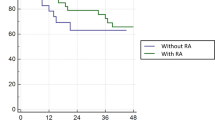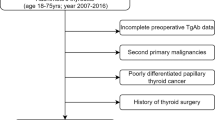Abstract
Purpose
Anti-thyroglobulin antibodies (TgAb) can be used as a surrogate tumor marker in the follow-up of papillary thyroid carcinoma (PTC). We try to determine if the change in TgAb levels in the first post-operative year is a good predictor of persistence/recurrence risk in TgAb-positive PTC patients.
Methods/patients
105 patients with PTC who underwent thyroidectomy between 1988 and 2014 were enrolled. We calculated the percentage of change in TgAb levels with the first measurement at 1–2 months after surgery and the second one at 12–14 months.
Results
TgAb negativization was observed in 29 patients (27.6%), a decrease of more than 50% was observed in 57 patients (54.3%), less than 50% in 12 patients (11.4%) and in 7 patients (6.7%) the TgAb level had increased. The percentage of persistence/recurrence was 0, 8.8, 16.7 and 71.4% in each group, respectively (p < 0.001). In the multivariate analysis, only the percentage of change in TgAb showed a significant association with the risk of persistence/recurrence, regardless of other factors such as age, size and TNM stages.
Conclusions
Changes in TgAb levels in the first year after surgery can predict the risk of persistence/recurrence of TgAb-positive PTC patients. Patients who achieved negativization of TgAb presented an excellent prognosis.

Similar content being viewed by others
References
Spencer CA. Editorial: challenges of serum thyroglobulin (Tg) measurement in the presence of Tg autoantibodies. J Clin Endocrinol Metab. 2004;89(8):3702–4.
Demers LM, Spencer CA. Laboratory medicine practice guidelines: laboratory support for the diagnosis and monitoring of thyroid disease. Clin Endocrinol. 2003;58(2):138–40.
Spencer C, Petrovic I, Fatemi S, LoPresti J. Serum thyroglobulin (Tg) monitoring of patients with differentiated thyroid cancer using sensitive (second-generation) immunometric assays can be disrupted by false-negative and false-positive serum thyroglobulin autoantibody misclassifications. J Clin Endocrinol Metab. 2014;99(12):4589–99.
Haugen BR, Alexander EK, Bible KC, Doherty GM, Mandel SJ, Nikiforov YE, et al. 2015 American thyroid association management guidelines for adult patients with thyroid nodules and differentiated thyroid cancer: the American thyroid association guidelines task force on thyroid nodules and differentiated thyroid cancer. Thyroid. 2016;26(1):1–133. doi:10.1089/thy.2015.0020.
Medeiros Neto G. Iodine supplementation and thyroid autoimmunity. Clin Endocrinol. 1994;40(3):435.
Pacini F, Mariotti S, Formica N, Elisei R, Anelli S, Capotorti E, et al. Thyroid autoantibodies in thyroid-cancer incidence and relationship with tumor outcome. Acta Endocrinol. 1988;119(3):373–80.
Kumar A, Shah DH, Shrihari U, Dandekar SR, Vijayan U, Sharma SM. Significance of antithyroglobulin autoantibodies in differentiated thyroid-carcinoma. Thyroid. 1994;4(2):199–202.
Spencer CA, Takeuchi M, Kazarosyan M, Wang CC, Guttler RB, Singer PA, et al. Serum thyroglobulin autoantibodies: prevalence, influence on serum thyroglobulin measurement, and prognostic significance in patients with differentiated thyroid carcinoma. J Clin Endocrinol Metab. 1998;83(4):1121–7.
Rubello D, Casara D, Girelli ME, Piccolo M, Busnardo B. Clinical meaning of circulating antithyroglobulin antibodies in differentiated thyroid cancer. A prospective study. J Nucl Med. 1992;33(8):1478–80.
Chung JK, Park YJ, Kim TY, So Y, Kim SK, Park DJ, et al. Clinical significance of elevated level of serum antithyroglobulin antibody in patients with differentiated thyroid cancer after thyroid ablation. Clin Endocrinol. 2002;57(2):215–21.
Gorges R, Maniecki M, Jcntzen W, Sheu SNY, Mann K, Bockisch A, et al. Development and clinical impact of thyroglobulin antibodies in patients with differentiated thyroid carcinoma during the first 3 years after thyroidectomy. Eur J Endocrinol. 2005;153(1):49–55.
Hollowell JG, Staehling NW, Flanders WD, Hannon WH, Gunter EW, Spencer CA, et al. Serum TSH, T(4), and thyroid antibodies in the United States population (1988–1994): national health and nutrition examination survey (NHANES III). J Clin Endocrinol Metab. 2002;87(2):489–99.
Qin J, Yu ZQ, Guan HX, Shi LF, Liu YP, Zhao N, et al. High thyroglobulin antibody levels increase the risk of differentiated thyroid carcinoma. Dis Markers. 2015; 2015:648–670.
Kim ES, Lim DJ, Baek KH, Lee JM, Kim MK, Kwon HS, et al. Thyroglobulin antibody is associated with increased cancer risk in thyroid nodules. Thyroid. 2010;20(8):885–91.
Grebe SKG. Thyroglobulin autoantibodies, thyroid nodules, and new insights into some old questions. Thyroid. 2010;20(8):841–2.
Phan HTT, Jager PL, van der Wal JE, Sluiter WJ, Plukker JTM, Dierckx R, et al. The follow-up of patients with differentiated thyroid cancer and undetectable thyroglobulin (Tg) and Tg antibodies during ablation. Eur J Endocrinol. 2008;158(1):77–83.
Soyluk O, Boztepe H, Aral F, Alagol F, Ozbey NC. Papillary thyroid carcinoma patients assessed to be at low or intermediary risk after primary treatment are at greater risk of long term recurrence if they are thyroglobulin antibody positive or do not have distinctly low thyroglobulin at initial assessment. Thyroid. 2011;21(12):1301–8.
Kim TY, Kim WB, Kim ES, Ryu JS, Yeo JS, Kim SC, et al. Serum thyroglobulin levels at the time of (131)I remnant ablation just after thyroidectomy are useful for early prediction of clinical recurrence in low-risk patients with differentiated thyroid carcinoma. J Clin Endocrinol Metab. 2005;90(3):1440–5.
Seo JH, Lee SW, Ahn BC, Lee J. Recurrence detection in differentiated thyroid cancer patients with elevated serum level of antithyroglobulin antibody: special emphasis on using 18F-FDG PET/CT. Clin Endocrinol. 2010;72(4):558–63.
Durante C, Tognini S, Montesano T, Orlandi F, Torlontano M, Puxeddu E, et al. Clinical aggressiveness and long-term outcome in patients with papillary thyroid cancer and circulating anti-thyroglobulin autoantibodies. Thyroid. 2014;24(7):1139–45.
Chiovato L, Latrofa F, Braverman LE, Pacini F, Capezzone M, Masserini L, et al. Disappearance of humoral thyroid autoimmunity after complete removal of thyroid antigens. Ann Intern Med. 2003;139(5):346–51.
Kim WG, Yoon JH, Kim WB, Kim TY, Kim EY, Kim JM, et al. Change of serum antithyroglobulin antibody levels is useful for prediction of clinical recurrence in thyroglobulin-negative patients with differentiated thyroid carcinoma. J Clin Endocrinol Metab. 2008;93(12):4683–9.
Spencer C, Fatemi S. Thyroglobulin antibody (TgAb) methods—strengths, pitfalls and clinical utility for monitoring TgAb-positive patients with differentiated thyroid cancer. Best Pract Res Clin Endocrinol Metab. 2013;27(5):701–12.
Tsushima Y, Miyauchi A, Ito Y, Kudo T, Masuoka H, Yabuta T, et al. Prognostic significance of changes in serum thyroglobulin antibody levels of pre- and post-total thyroidectomy in thyroglobulin antibody-positive papillary thyroid carcinoma patients. Endocr J. 2013;60(7):871–6.
Yamada O, Miyauchi A, Ito Y, Nakayama A, Yabuta T, Masuoka H, et al. Changes in serum thyroglobulin antibody levels as a dynamic prognostic factor for early-phase recurrence of thyroglobulin antibody-positive papillary thyroid carcinoma after total thyroidectomy. Endocr J. 2014;61(10):961–5.
Hsieh CJ, Wang PW. Sequential changes of serum antithyroglobulin antibody levels are a good predictor of disease activity in thyroglobulin-negative patients with papillary thyroid carcinoma. Thyroid. 2014;24(3):488–93.
Edge SB, Compton CC. The American joint committee on cancer: the 7th edition of the AJCC cancer staging manual and the future of TNM. Ann Surg Oncol. 2010;17(6):1471–4.
Li C, Yu W, Fan J, Li G, Tao X, Feng Y, et al. Thyroid functional parameters and correlative autoantibodies as prognostic factors for differentiated thyroid cancers. Oncotarget. 2016;7(31):49930–8.
Acknowledgements
We would like to thank our center for the technical support.
Author information
Authors and Affiliations
Corresponding author
Ethics declarations
Funding
This research did not receive any specific grant from any funding agency in the public, commercial or not-for-profit sector.
Conflict of interest
The authors declare that they have no conflict of interest.
Human and animal rights statement
The research involving human participants are conducted in a way which respects the dignity, rights, and welfare of participants.
Ethical approval
This study was conducted in compliance with ethical principles based on the Declaration of Helsinki and with the approval of the ethics committee of our center. We used anonymous data for the research.
Rights and permissions
About this article
Cite this article
Ernaga-Lorea, A., Hernández-Morhain, M.C., Anda-Apiñániz, E. et al. Prognostic value of change in anti-thyroglobulin antibodies after thyroidectomy in patients with papillary thyroid carcinoma. Clin Transl Oncol 20, 740–744 (2018). https://doi.org/10.1007/s12094-017-1782-3
Received:
Accepted:
Published:
Issue Date:
DOI: https://doi.org/10.1007/s12094-017-1782-3




